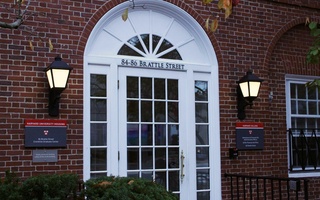{shortcode-8d7a6f66f4ef511bf68d02bc9ed3b2b72ac68c2b}The hundreds of documents released Friday in the ongoing admissions lawsuit against Harvard will likely fail to prove the College discriminates against Asian American applicants but could still hurt Harvard’s chance of winning in court, according to several legal experts.
The lawsuit, filed in 2014 by anti-affirmative action advocacy group Students for Fair Admissions, alleges Harvard discriminates against Asian American students seeking admittance to the College, a charge the University has repeatedly denied. Both Harvard and SFFA posted documents last week in an attempt to convince Judge Allison D. Burroughs to decide the case early in their respective favors.
A portion of the papers released last week reveal Harvard conducted a confidential internal review of its admissions process in late 2012 and early 2013, ultimately concluding its policies produce “negative effects” for Asian American applicants. Asian American “high achievers” saw lower rates of admission and consistently earned poorer “personal” ratings form admissions officers despite earning high rankings for their academic records and test scores, per the Harvard review, conducted by the University’s Office of Institutional Research.
Savannah Law School associate professor Vinay Harpalani, who said he supports the use of affirmative action in college admissions, said some documents published Friday disclose what he called Harvard’s “problematic behavior” toward Asian Americans.
“I'd be surprised if SFFA were able to prove intentional discrimination against Asian Americans,” Harpalani said. “But by making Harvard release all this information, it would at least strengthen the other part of their case that Harvard is using race in unconstitutional ways.”
Roger Clegg, the President and General Counsel for the Center of Equal Opportunity, said he believes the internal study comprises “particularly strong” evidence against the University.
“This was something, other than simply the statistical evidence that I knew the plaintiffs would be able to discover, this was something in addition to that that I think was very damning of Harvard, very helpful to the plaintiffs,” Clegg said.
But Kimberly West-Faulcon, a former civil rights attorney who has litigated cases centered on race discrimination in higher education, said the statistical analyses included in Friday’s filings are more compelling than the internal report.
SFFA filed two studies on Harvard’s use of race in admissions, one authored by Duke University professor Peter S. Arcidiacono and one authored by senior fellow at The Century Foundation Richard D. Kahlenberg ’85. Harvard hired its own expert, University of California, Berkeley professor David E. Card, to analyze Arcidiacono’s and Kahlenberg’s reports.
“I think it will boil down to, as folks often say, the battle of the experts and whether the court thinks that what the experts have presented so far is sufficient to really resolve that battle,” West-Faulcon said. “If the judge thinks one experts has very much more convincingly and credibly relied on the data and is convinced of that, the judge could very well decide that this is enough to be done with this.”
West-Faulcon said the expert reports would likely be more relevant than the internal Harvard review moving forward because “the conclusions in those are much more thorough.” In its own filings, Harvard wrote the OIR reports were “incomplete, preliminary, and based on limited inputs.”
Despite SFFA’s arguments, experts said it is unlikely the case will be settled without a trial. Judge Allison D. Burroughs of the U.S. District Court in Boston previously indicated an early settlement is unlikely.
“I think it's going to be difficult for this case to be resolved on summary judgement,” Harpalani said. “I don't think SSFA has shown intentional discrimination or would win on a summary judgement posing on intentional discrimination.”
Harpalani added SFFA’s claims of intentional discrimination demand a “very high standard” of proof.
“These are rarely summary judgement type cases,” said Mishell B. Kneeland, former Assistant Attorney General of Texas and one of the lawyers representing University of Texas in the 2016 Fisher v. UT-Austin affirmative action case.
Clegg said he believes that summary judgement would be “appropriate” as the plaintiffs have made “as persuasive a case as one could imagine.” He added, however, that—due to the high-profile nature of the case—summary judgement would be unlikely.
“The standard for winning a case on a motion for summary judgment is difficult for anyone and speaking in a case like this, which is so high-profile where it's being litigated with very good lawyers on both sides and a lot of the evidence is disputed, one would have to predict that the judge would probably give both sides, literally, their day in court,” Clegg said.
Correction: June 25, 2018
A previous version of this article misquoted Roger Clegg. The article has been updated to accurately reflect his comments.
—Staff writer Angela N. Fu can be reached at angela.fu@thecrimson.com. Follow her on Twitter @angelanfu.
—Staff writer Lucy Wang can be reached at lucy.wang@thecrimson.com. Follow her on Twitter @lucyyloo22.
Read more in News
Corporate Funding Concerns Shut Down Medical School Prof’s StudyRecommended Articles
-
 Harvard Admissions Lawsuit Could Be Heard in Summer 2018
Harvard Admissions Lawsuit Could Be Heard in Summer 2018 -
 Tentative Jan. 2019 Date Set for Admissions Lawsuit Trial
Tentative Jan. 2019 Date Set for Admissions Lawsuit Trial -
 Internal Harvard Review Showed Disadvantage for Asian Applicants
Internal Harvard Review Showed Disadvantage for Asian Applicants -
Students for Fair Admissions and Harvard Both Got It WrongLet us oppose discrimination and lift each other up at the same time.
-
 Harvard Asks Court to Exclude Evidence of Past Anti-Semitism in Admissions Trial
Harvard Asks Court to Exclude Evidence of Past Anti-Semitism in Admissions Trial













